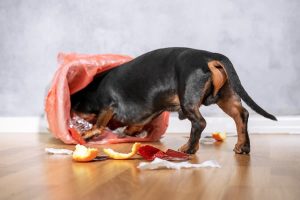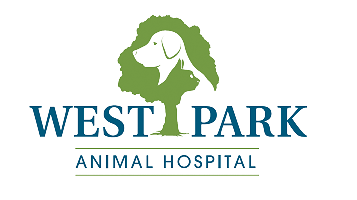Pet Toxin Prevention Services in Cleveland, OH
 P
P
ets are known for their ability to get into anything. While in some cases, this tendency leads to no more than a humorous incident, in others, it is seriously dangerous. West Park Animal Hospital provides toxin prevention resources and critical care for pet owners in Ohio, including West Park, North Olmsted, Berea, Rocky River, Lakewood, Fairview Park, and Cleveland. With our assistance, you can protect your beloved companion from common household and environmental toxins for pets.
Take Care with These Common Household Toxins for Pets
Most households are full of toxic materials. While some can simply be removed, others you cannot do without. These should be stored securely and out of your pet’s reach. High locations are not always safe; consider a drawer, cabinet, or closet that cannot be nosed open. You should also be careful when using these products so curious animals cannot get close. Apply this caution with any of the following common household toxins:
Household Products
Almost all household cleaning and maintenance products, including homemade and “natural” products, are toxic to pets. Here is a list that covers many hazardous household products for pets, but be aware there are others:
- Ammonia
- Antifreeze and deicer
- Bleach and bleach-based cleaners
- Carpet or rug cleaners and deodorizers
- Essential oils
- Glue and adhesives
- Laundry and dishwasher detergent
- Paint and solvents
- Plant fertilizers
- Vinegar
- Window cleaners
Pest Control Products
Many pest control products, including mouse bait and insecticides, work because they are toxic. They are just as deadly to your pets as they are to the household pests they are designed for. Always make sure these products are stored securely and be careful in how you apply them around your home to ensure that pets will not be harmed. The most dangerous of these would include slug bait and rodenticides.
Medications
Medications may be helpful for humans, but they are not pet-safe. The following common over-the-counter (OTC) and prescription medications are toxic to animals:
- ADD and ADHD medications
- Allergy and decongestant medications
- Antidepressants
- Blood pressure medications
- Non-steroidal anti-inflammatory drugs (NSAIDs)
- Pain relief medications
- Sleep aids
Keep in mind that child-proof plastic containers are not necessarily pet-proof. Animals can chew through plastic pill bottles and blister packages.
Foods
Some favorite human foods can be fatal to cats and dogs, so always research before sharing snacks from your plate. The following list contains some, but not all, of the most dangerous human foods for pets:
- Alcohol
- Chocolate
- Coffee and caffeine
- Grapes and raisins
- Macadamia nuts
- Onions
- Raw dough with yeast
- Sugar-free sweeteners
- Walnuts
Tobacco and Marijuana
Tobacco and marijuana are both toxic to animals, as are products that contain them. Cigarettes, chewing tobacco, fresh and dried marijuana buds, edibles, oils, vapes, and other products should be stored securely. Take care when using these items to keep them away from your pets.
Plants
Many plants are safe for pets. Others, however, cause mild to severe reactions, especially in cats. The following plants should be avoided in your home and yard to keep pets safe:
- Aloe vera
- Azalea
- Chrysanthemum
- Crocus
- Daffodil
- Daisy
- English Ivy
- Hyacinth
- Lilies
- Many Types of Mushrooms
- Marijuana
- Poinsettia
- Sago palm
- Tulip
Common Signs of Poisoning in Pets
As careful as their owners may be, pets often get into things they shouldn’t. It can take only seconds for your pet to steal a piece of chocolate or spill a bottle of cleaner. When this happens, it is important that pet owners recognize the signs. The following are common symptoms of poisoning in pets:
- Bloody stool or urine
- Diarrhea
- Drooling
- Excessive thirst or urination
- Heavy breathing
- Loss of appetite
- Pale or yellowish gums
- Seizures
- Uncharacteristic sluggishness
- Unsteady gait
- Vomiting
Pet poisonings can also cause long-term effects, including anemia and cardiovascular issues. In extreme cases, there may be damage to internal organs or even organ failure.
What to Do if Your Pet Has Been Poisoned
If you think your pet has ingested a potentially toxic substance, contact Animal Poison Control immediately at 888-426-4435. Their team of certified toxicologists can assess the situation and let you know if veterinary care is needed. If treatment is recommended, they’ll provide a case number and guidance to help our team at West Park Animal Hospital act quickly and effectively when you arrive. If you’re advised to seek veterinary care, please call us right away so we can prepare for your pet’s arrival. Before you call, make note of the following information if possible:
- What your pet ingested
- How much was ingested
- When it happened
- Your pet’s weight
This information will help us plan the most appropriate treatment. Depending on your pet’s condition, you may need to schedule a veterinary appointment or seek emergency care. Bring a sample of the toxin and a photograph of its packaging if you can. A vomit or stool sample may also be helpful. The veterinarian will recommend a treatment plan based on the toxin ingested.
Prevent and Treat Pet Poisonings in Cleveland, OH
If your pet may have ingested a toxin, West Park Animal Hospital can help. Our caring team will help you understand your treatment options. We are located in Cleveland, OH, with veterinary services available to residents in West Park, North Olmsted, Berea, Rocky River, Lakewood, Fairview Park, and Cleveland. Contact us to learn more about our facility and common household toxins for pets.
PET RESOURCES
Thank you for your Cleveland Hot List votes. We were voted #1 again for the 5th year in a row! We are happy to continue to serve the community and appreciate your support.




